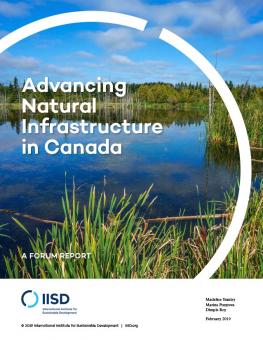
Advancing Natural Infrastructure in Canada: A forum report
The Advancing Natural Infrastructure in Canada forum convened Canadian experts to discuss how natural infrastructure can build climate-resilient cities/landscapes. This report highlights forum presentations, discussions, insights and next steps.
Key Messages
- Natural infrastructure (NI) is being recognized as an important response to accelerating risks related to climate change, the widening infrastructure gap resulting from aging infrastructure and the growing infrastructure needs in Canada and globally.
- The Advancing Natural Infrastructure in Canada forum provided key insights and next steps to improve the implementation of NI across Canada, including the need for dedicated funding programs, outcome evaluation and performance metrics, guidance and capacity building for planning and implementation, and communication.
In Canada and globally, there is growing use of natural infrastructure (NI)—actively managed natural systems and resources such as plants, soil and wetlands—to address increasing risks related to climate change and to meet pressing environmental and economic needs. A recent report on Combating Canada’s Rising Flood Costs by the Intact Centre on Climate Adaptation, IISD and the Insurance Bureau of Canada shows that NI projects across the country demonstrate value for money in providing critical benefits to local communities and broader societal needs.
On November 14, 2018, IISD, along with Insurance Bureau of Canada and ALUS Canada, convened the Advancing Natural Infrastructure in Canada forum in Winnipeg. This forum brought together experts in related fields from across the country to discuss how Canada can use NI to build more resilient cities, towns and landscapes in the face of increasing climate uncertainty.
The day-long forum was divided into three main sessions, with presentations and discussions related to: (i) understanding the importance of NI in the context of increasing infrastructure needs and the impacts of climate change; (ii) discussing existing and innovative financing for NI; and (iii) understanding opportunities and barriers to implementing NI projects in Canada.
The forum provided a number of different insights that are detailed in the report. Prominent among these is a need for: more demonstrated projects, natural assets being considered in public sector accounting, performance metrics and guidance at the infrastructure planning and implementation levels.
You might also be interested in
IISD Annual Report 2023–2024
While IISD's reputation as a convenor, a trusted thought leader, and a go-to source on key issues within the sustainable development field is stronger than ever, the work happening outside the spotlight is just as valuable.
COP 29 Outcome Moves Needle on Finance
In the last hours of negotiations, concerted pressure from the most vulnerable developing countries resulted in an improved outcome on the finance target, with a decision to set a goal of at least USD 300 billion per year by 2035 for developing countries to advance their climate action.
What to Expect at Plastics INC-5
Q and A with Tallash Kantai of Earth Negotiations Bulletin on INC-5.
The Chemical Analysis of Fresh Water (Third Edition)
This publication describes the protocols used in the IISD Experimental Lakes Area Analytical Service Laboratory for the measurement of chemical constituents in freshwater samples.